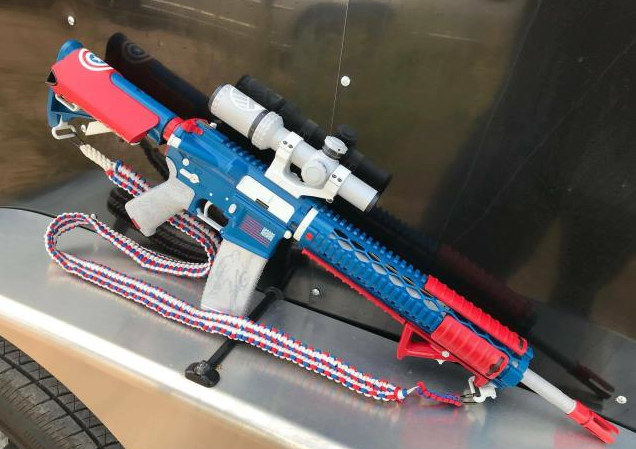I am not sure if "graffiti" is not the proper term here, but I could not think up a better word to describe the act of defacing a firearm.
Years ago Law Enforcement would encourage people to inscribe upon their firearms with their Social Security number or their Driver's License number.
While the Driver's license may have helped law enforcement find the correct owner, The SS number may make it a little more difficult to track down the owner.
Today we try very hard to protect those numbers and the last person we would want to have those numbers are the criminals who steal guns, our identify is worth more than a $400 or $500 gun.
Now that we live in the age of information, it should be easy to track a stolen firearm by the serial number. The problem is many people don't report their firearms stolen (for a variety of reasons) and many of those that do, bought the guns second hand and failed to record the serial numbers. Telling the Police that the gun was "black with wood grips", does nothing in assisting them.
Let this be a warning to you, record your serial numbers. I have used software in the past, but the when the software isn't supported it inevitably fails to work. Now I use Powerpoint, I simply import a picture of the gun onto the slide, then add pertinent info, like the make, model, barrel length and serial #. Then save the slides as jpgs or pdfs. An example is below:
Just as bad is when someone mistakenly writes down the wrong information. For instance ".38 S&W Special" is not the model of a gun, it is probably a Smith & Wesson model 10 (or 15 or 36 or..), chambered in .38 S&W Special, but the owner was not savvy enough to know where the model number of the gun is stamped.
I was reminded of this after I refinished two revolvers that had "graffiti" on them. Then I went in search of other guns with similar defacements.
If you are not aware this is a continuation of a post I did back in October of 2015, see that post here
The original post was inspired by this Winchester model 94. The owner brought it to me and asked me to refinish it. Unfortunately this was one of the Winchesters made during the 70's which had a sintered steel receiver and could not be blued with traditional methods.
Century Arms has been guilty of this for a while, I am not sure why they think it is so important to put their name on the side of a firearm (firearms import rules notwithstanding).
Case in Point: A Marlin model of 1893, the code is CAI (Century Arms International) ST AB (St. Albans) VT (Vermont). I doubt this gun was re-imported back into the US, but I could be wrong.
Another one, this is no doubt an LEO trade in, Smith & Wesson model 19-4
Some more graffiti:
The owner of this gun made the mistake (or maybe it wasn't a mistake?) of marking the side plate, a part that is easily replaced.
The owner of this S&W model 27 marked both the frame on the left side, but also the inside top of the cylinder window
This owner inscribed the number 52 on his Dan Wesson model 14, a badge number perhaps?
The owner of this model 12 shotgun, put his DL number in two places....both parts that could be swapped out, but not likely by the person who stole the gun
Some mental giant scratched their initials onto this surplus M911A1, while this can be fixed, the finish on the slide would no longer be original.
This owner put his SS# on the back side of his 10/22's aluminum butt plate, this really isn't graffiti as no one will see it and it is probably pretty smart as no one would think to look for it there except the person reporting the gun stolen.
A Winchester model 290 semi-auto 22 rifle, initials carved into the aluminum receiver
In case you were wondering I do often successfully remove the graffiti from these firearms, some before and after pictures:
The S&W model 19 before and after:
The S&W model 27 before and after
The Marlin 1893 before and after
The Dan Wesson
Merriam-Webster


































































